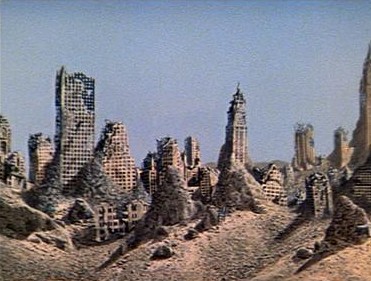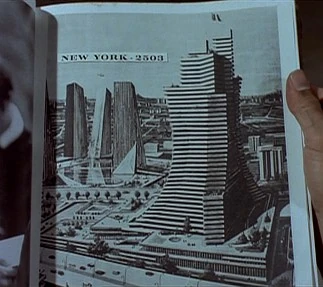(→Planet of the Apes (TV Series): Removing unsourced editorializing.) Tag: sourceedit |
No edit summary Tag: sourceedit |
||
| Line 7: | Line 7: | ||
In the follow-up movie, New York City, buried under a canopy of bomb-melted rock, was revealed to be the home of a race of [[Mutant|mutated humans]]. The actual city was not shown, but sets from other productions represented the remnants of the city and clever use of photographs depicted the various locations. In the initial story treatment it was detailed that a huge earth subsidence had buried the city when the last Atom Bomb exploded in up-state New York in about 1995, and that when an ape army attacked the mutant stronghold in the time after Taylor's arrival, the [[Wikipedia:Empire State Building|Empire State Building]] was their first target.<ref>[http://pota.goatley.com/scripts/pota_revisited_treatment.pdf ''Planet of the Apes Revisited'' Treatment] at Hunter's Planet of the Apes Scripts Archive</ref> In a subsequent script version, New York is described as looking like it ''"was buried in the nuclear war of 1990"'' <ref>[http://pota.goatley.com/scripts/pota_revisited_first.pdf ''Planet of the Apes Revisited'' First Draft Screenplay] at Hunter's Planet of the Apes Scripts Archive</ref> |
In the follow-up movie, New York City, buried under a canopy of bomb-melted rock, was revealed to be the home of a race of [[Mutant|mutated humans]]. The actual city was not shown, but sets from other productions represented the remnants of the city and clever use of photographs depicted the various locations. In the initial story treatment it was detailed that a huge earth subsidence had buried the city when the last Atom Bomb exploded in up-state New York in about 1995, and that when an ape army attacked the mutant stronghold in the time after Taylor's arrival, the [[Wikipedia:Empire State Building|Empire State Building]] was their first target.<ref>[http://pota.goatley.com/scripts/pota_revisited_treatment.pdf ''Planet of the Apes Revisited'' Treatment] at Hunter's Planet of the Apes Scripts Archive</ref> In a subsequent script version, New York is described as looking like it ''"was buried in the nuclear war of 1990"'' <ref>[http://pota.goatley.com/scripts/pota_revisited_first.pdf ''Planet of the Apes Revisited'' First Draft Screenplay] at Hunter's Planet of the Apes Scripts Archive</ref> |
||
| ⚫ | |||
[[Image:newyork2503.jpg|right|The ''TV series'' Astronauts discover they are on Earth]] |
[[Image:newyork2503.jpg|right|The ''TV series'' Astronauts discover they are on Earth]] |
||
| ⚫ | |||
| − | Shortly after their crash-landing, astronauts [[Alan Virdon]] and [[Peter Burke]] discover a book which includes a picture of a futuristic city, captioned ''"New York - 2503"''. This is the evidence that tells them they have returned to Earth far into their own future. |
+ | Shortly after their crash-landing, astronauts [[Alan Virdon]] and [[Peter Burke]] discover a book which includes a picture of a futuristic city, captioned ''"New York - 2503"''. This is the evidence that tells them they have returned to Earth far into their own future. |
| − | == |
+ | ==Trivia== |
| + | * The picture featured in the TV Series presents serious problems for those fans trying to reconcile the continuity of the series with that of the movies: ''Battle'' and ''Conquest'' depict an ape revolution overthrowing human civilisation in the 1990s, 500 years before the date in the picture. It could be interpreted as a prediction of New York's landscape made before the ape revolution, or as part of an alternative 'original' timeline described by [[Cornelius I|Cornelius]] in ''Escape'', in which the ape revolution occurred many centuries later ''(See: [[Circular vs Linear Timelines]])''. |
||
==Appearances== |
==Appearances== |
||
Revision as of 01:43, 7 November 2015
New York City is the most populous city in the United States and the centre of one of the most populous urban agglomerations on Earth. Located on one of the world's largest natural harbours, the area was originally inhabited by Algonquian tribes, including the Lenape, whose homeland included Staten Island, the western portion of Long Island (including the area that would become Brooklyn and Queens), Manhattan, and the Lower Hudson Valley (including The Bronx). The harbour was claimed for France and named 'Nouvelle Angoulême' in 1524, and between 1609 and 1614 the area between Cape Cod and Delaware Bay would be claimed by the Dutch Republic and called 'Nieuw Nederland', but a permanent presence by European colonists only began in 1624, followed by the construction of Nieuw Amsterdam on Manhattan Island, bought from the Lenape in 1626. In 1664, at the end of the Second Anglo-Dutch War, Nieuw Amsterdam was surrendered to the English and
renamed New York after King Charles II of England granted the lands to his brother, the Duke of York (later King James II). By 1700, the native Lenape population had dwindled to just 200 through European-borne diseases and wars. Under British rule in the 1700s New York grew as a trading and slavery port, and during the American Revolutionary War the city became the British Loyalist military and political base of operations until evacuated in 1783. New York served as the capital of the newly-independent United States from 1785 until 1790, centred around Federal Hall on Wall Street. In 1898, the modern City of New York was formed with the consolidation of Brooklyn (until then a separate city), the County of New York (which then included parts of the Bronx), the County of Richmond, and the western portion of the County of Queens - organised as five boroughs: The Bronx, Brooklyn, Manhattan, Queens, and Staten Island. In the twentieth century New York became one of the dominant cities of the world, with the leading financial centre based in Wall Street and the home of the United Nations Headquarters (completed in 1950). The Statue of Liberty - a gift to the United States from the people of France, housed on Liberty Island New York Harbor and completed in 1886 - is a symbol of freedom and international friendship, and an icon of the United States. Other landmarks of the city include St. Patrick's Cathedral, Radio City Music Hall, Grand Central Terminal and Queensboro Plaza.
Planet of the Apes
The climax to the original movie showed Taylor's shock discovery of the Statue of Liberty, revealing that the bizarre place he had been living in was in fact a future Earth. The specific region around New York had become the seemingly dead and uninhabited Forbidden Zone, while the wider general area included the location of Ape City.
Beneath the Planet of the Apes
In the follow-up movie, New York City, buried under a canopy of bomb-melted rock, was revealed to be the home of a race of mutated humans. The actual city was not shown, but sets from other productions represented the remnants of the city and clever use of photographs depicted the various locations. In the initial story treatment it was detailed that a huge earth subsidence had buried the city when the last Atom Bomb exploded in up-state New York in about 1995, and that when an ape army attacked the mutant stronghold in the time after Taylor's arrival, the Empire State Building was their first target.[1] In a subsequent script version, New York is described as looking like it "was buried in the nuclear war of 1990" [2]
Planet of the Apes (TV Series)
Shortly after their crash-landing, astronauts Alan Virdon and Peter Burke discover a book which includes a picture of a futuristic city, captioned "New York - 2503". This is the evidence that tells them they have returned to Earth far into their own future.
Trivia
- The picture featured in the TV Series presents serious problems for those fans trying to reconcile the continuity of the series with that of the movies: Battle and Conquest depict an ape revolution overthrowing human civilisation in the 1990s, 500 years before the date in the picture. It could be interpreted as a prediction of New York's landscape made before the ape revolution, or as part of an alternative 'original' timeline described by Cornelius in Escape, in which the ape revolution occurred many centuries later (See: Circular vs Linear Timelines).
Appearances
External links
- New York landmarks seen in the Apes movies
- Comparison of Cornelius' map with modern New York
- New York City article at Wikipedia
References
- ↑ Planet of the Apes Revisited Treatment at Hunter's Planet of the Apes Scripts Archive
- ↑ Planet of the Apes Revisited First Draft Screenplay at Hunter's Planet of the Apes Scripts Archive


